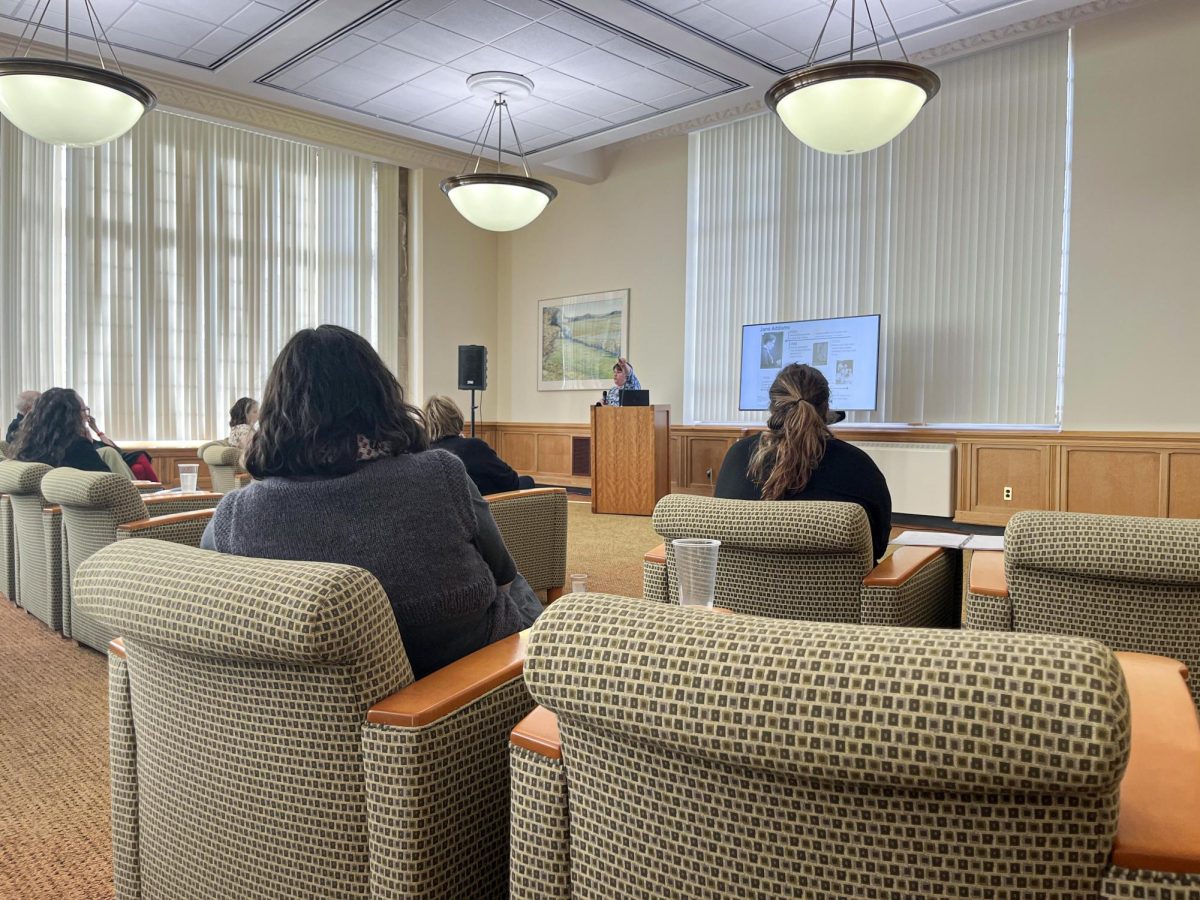Gluten freedom growing option for students
Students who are gluten-intolerant have several allies on campus that can help to accommodate their nutritional needs.
Gluten intolerance is a condition people of any age can suffer from, explained Karla Kennedy-Hagan, chair and associate professor of family and consumer sciences.
The condition results when a person’s intestines cannot break down gluten, a protein found in wheat and related grains. The gluten forms a glue-like substance that can cause gastrointestinal issues, said Kennedy-Hagan, who is also a licensed and registered dietician that works with Eastern’s gluten-intolerant students.
Symptoms of gluten intolerance vary from person to person, she said, and can include irritable bowels, diarrhea and other gastrointestinal issues.
Colleen O’Sullivan, a senior family and consumer sciences major, is gluten-intolerant and said other symptoms can include headaches, rashes and fatigue.
O’Sullivan is the founder and president of the Gluten Freedom Club, a registered student organization founded in Spring 2012 to help gluten-intolerant students find nutritional options and connect with students who also have the condition.
O’Sullivan was diagnosed with a gluten intolerance at age 19, but said she had intestinal problems and migraines as a result of consuming gluten long before her diagnosis.
“I’ve had symptoms since I was 5 years old, and until I was 19 I was just diagnosed with other things and put on new medicines,” she said.
O’Sullivan said she knew very little about the condition before she was diagnosed and did not know how to handle her situation.
“When I found out, I had no idea what I could eat, and I had no one to go to, so I just had to figure it out on my own,” she said.
Kennedy-Hagan said gluten intolerance has been somewhat overlooked by medicine until recent years.
“It’s something that I think the industry of medicine has really honed in on,” she said. “I think gluten intolerance has been out there for quite awhile, it just hasn’t been recognized.”
O’Sullivan’s lack of knowledge about gluten intolerance and the limited resources she had to learn more about the condition motivated her to change her major from education to dietetics and to establish the Gluten Freedom Club.
“I changed to nutrition because I realized what it had done to me for 15 years, and I wouldn’t want that to happen to someone else,” she said.
One of the goals of the club is to help students learn more about gluten intolerance, she said, especially those students who think they might have the condition.
As well, O’Sullivan is working with gluten-intolerant students and Housing and Dining Services to try and incorporate more gluten-free food items for students in dining halls.
“There are a lot of students on campus who don’t necessarily tell the dining halls they are gluten-free, and they’ll just eat whatever they can,” she said. “Our goal this year is to find those students and encourage them to talk to a dining hall.”
Providing gluten-free food items to students is not only about options, O’Sullivan said. Accommodating gluten-free students is also about fairness.
“Students who have a dietary need still pay the same amount for a meal plan as everyone else, so they should still be able to eat just as much,” she said.
Gail Abrams-Aungst, the associate director of University Housing and Dining Services, said she has only had two students approach her to request gluten-free foods in Taylor and Stevenson dining halls.
She said she believes many students who might be gluten-intolerant might not come forward and approach her because students feel self-conscious about their condition.
However, she said she will work with students to accommodate their nutritional needs as discreetly as possible.
“If they meet with me, we can get that diet set up so that it’s done behind the scenes so that no one knows,” she said.
The University Housing and Dining Services buys gluten-free foods separately from Eastern’s food distributor because gluten-free foods are made without preservatives and expire quickly, Abrams-Aungst said.
To buy the correct amount of gluten-free foods and prevent spoilage, University Housing and Dining Services buys locally from County Market on a day-to-day basis, she said.
Apart from encouraging Housing and Dining Services to incorporate gluten-free foods on campus, O’Sullivan is also planning to work with local restaurants to encourage gluten-free food options on menus of making entirely separate gluten-free menus.
“It’s really hard when you go to a restaurant and they don’t have anything for you to eat,” she said. “We would just try and come up with a menu for them without them having to actually do any work or order new products.”
If a student believes they might have gluten-intolerance, Kennedy-Hagan encouraged students to speak with Sheila Baker, the medical director of Health Services.
Tim Deters can be reached at 581-2812 or tadeters@eiu.edu.









![[Thumbnail Edition] Eastern Illinois University baseball's hitting coach and recruiting coordinator Mike Pugliese urges players on the team to increase their effort after a slow start to its pregame routine at the team's first intrasquad scrimmage of the season at O'Brien Field on Jan. 31, 2025.](https://www.dailyeasternnews.com/wp-content/uploads/2025/03/BB_02_O-1-e1741909628540-1200x702.jpg)
![[Thumbnail Edition] Senior tennis player Luisa Renovales Salazar hits the tennis ball with her racket at the Darling Courts at the Eastern Illinois University campus in Charleston, ILL.](https://www.dailyeasternnews.com/wp-content/uploads/2025/03/Tennis_01_O-1-e1741807434552-1200x670.jpg)
![[Thumbnail Edition] Senior right-handed pitcher Tyler Conklin pitching in the Eastern Illinois University baseball team's intrasquad scrimmage at O'Brien Field in Charleston, Illinois on Jan. 31.](https://www.dailyeasternnews.com/wp-content/uploads/2025/03/TC_01_O-e1741567955534-1200x669.jpg)





![[Thumbnail Edition] Senior, forward Macy McGlone finds an open teammate to pass the ball too during the game against the Tennessee State Tigers 69-49, in Groniger Arena on the Eastern Illinois University campus, Charleston Ill.](https://www.dailyeasternnews.com/wp-content/uploads/2025/03/WBB_02_O-1-e1741228987440-1200x692.jpg)


















![E[Thumbnail Edition] Eastern Illinois softball freshman utility player Abbi Hatton deciding to throw the softball to home plate in a fielding drill during softball practice at the field house in Groniger arena on Tuesday Feb. 11.](https://www.dailyeasternnews.com/wp-content/uploads/2025/03/SB_03_O-e1741208880750-1-e1741209739187-1200x815.jpg)















![The Weeklings lead guitarist John Merjave [Left] and guitarist Bob Burger [Right] perform "I Am the Walrus" at The Weeklings Beatles Bash concert in the Dvorak Concert Hall on Saturday.](https://www.dailyeasternnews.com/wp-content/uploads/2025/03/WL_01_O-1200x900.jpg)
![The team listens as its captain Patience Cox [Number 25] lectures to them about what's appropriate to talk about through practice during "The Wolves" on Thursday, March 6, in the Black Box Theatre in the Doudna Fine Arts Center in Charleston, Ill.](https://www.dailyeasternnews.com/wp-content/uploads/2025/03/WolvesPre-12-1200x800.jpg)
















